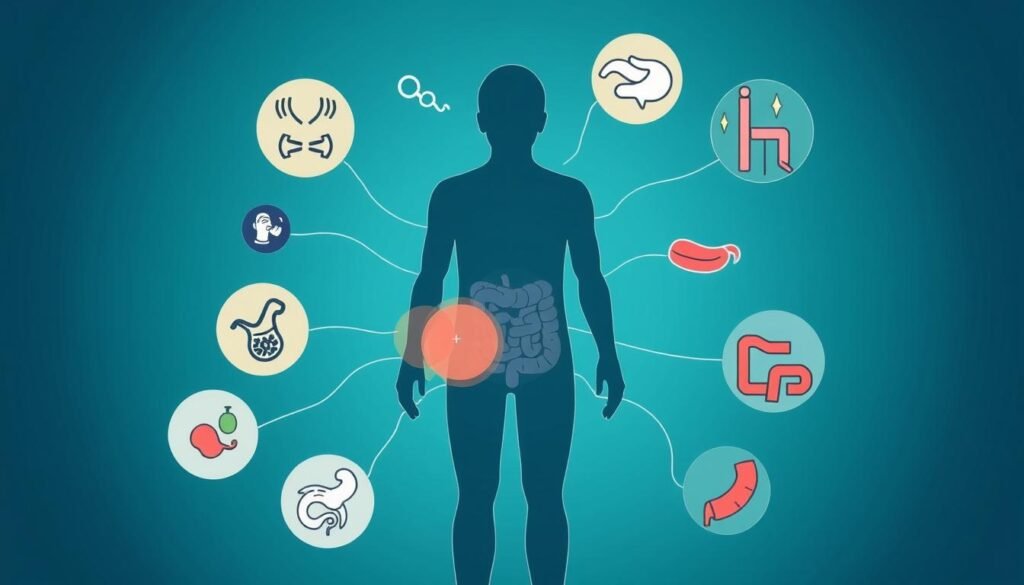Research shows that about one-third of people with irritable bowel syndrome (IBS) also deal with anxiety or depression. This link is crucial because it affects millions of people’s lives. With 38.1% of IBS patients facing anxiety, it’s key to know how to treat anxiety IBS.
The gut-brain axis is very important in this. It helps the brain and the gut talk to each other. Anxiety might not cause IBS, but it can make symptoms like bloating and stomach pain worse. This can make both conditions feed into each other. If we manage them well, we can feel a lot better.
Let’s talk about how to manage anxiety IBS. We’ll look at ways to handle stress, reduce anxiety, and find treatments that work for those with both issues. By understanding these methods, people can find relief and get healthier.
Key Takeaways
- One-third of IBS patients also experience anxiety or depression.
- Effective management is essential due to the bidirectional relationship between anxiety and IBS.
- The gut-brain axis significantly impacts how these disorders manifest.
- Lifestyle changes can greatly improve symptoms for many individuals.
- Understanding personal triggers is crucial for managing IBS and anxiety.
- Professional help is often recommended for severe symptoms.
- Medication and psychotherapy can be effective treatment options for IBS-related anxiety.
Understanding the Gut-Brain Connection
The gut and brain are closely linked, impacting our overall well-being. They communicate through the gut-brain axis. This connection is crucial for both our mental and gastrointestinal health.
Problems in this communication can cause gut issues, like IBS, especially for anxious people. Knowing about this connection helps in managing IBS symptoms better.
The Role of the Gut-Brain Axis
The gut-brain axis connects through nervous, endocrine, and immune systems. It sends signals using nerves and chemicals like serotonin. Changes in this system affect both our stomach and mind.
For IBS, antidepressants can ease symptoms by acting on gut nerve cells. This shows how intertwined our gut and brain are.
How Gastrointestinal Issues Impact Mental Health
IBS and other gut problems can hurt mental health too. About 40% of people face functional bowel issues, leading to stress and sadness. People with IBS often have had stress or anxiety before.
Knowing the gut-brain link opens doors for treatments. Probiotics are being studied for their mood and gut benefits.
| Impact Factors | Effects on Gut Health | Effects on Mental Health |
|---|---|---|
| Stress | Can worsen gut motility and increase sensitivity | May lead to heightened anxiety and depression |
| Microbiome Imbalance | Influences intestinal inflammation and pain | Affects mood regulation and cognition |
| Gut Infections | Can lead to post-infectious IBS symptoms | Associated with increased anxiety levels |
The Link Between Anxiety and IBS
Anxiety disorders and irritable bowel syndrome (IBS) share a complex relationship. Many with IBS also face high anxiety, making their symptoms worse. Knowing how they’re connected helps us find better treatments.
Comorbidity of Anxiety and IBS
Many people with irritable bowel syndrome also struggle with anxiety. Research shows that up to 40% of those with IBS may have anxiety. The stress from the COVID-19 pandemic made this even clearer. It increased anxiety in people with and without IBS equally.
Shared Genetic Pathways
Studies have found shared genes between anxiety disorders and IBS. This means you might be more likely to have both. Discovering these links opens up new ways to treat both your mind and gut together.
How IBS Symptoms Worsen Anxiety
IBS symptoms can make anxiety much worse. Older patients or those with higher anxiety levels often see their IBS symptoms get worse. Things like living in cities or job worries can add to this, showing how our environment impacts our well-being.
Identifying IBS Symptoms
Knowing the symptoms of irritable bowel syndrome (IBS) is key for handling it well. IBS can deeply affect daily activities. It’s important to know its symptoms and their link to anxiety. This knowledge helps manage the discomfort.
Common Symptoms of IBS
IBS leads to several upsetting symptoms. They mainly include:
- Bloating
- Cramping and abdominal pain
- Diarrhea or constipation
- Increased gas
- Changes in stool frequency and appearance
- Sensation of incomplete evacuation
Between 6% and 18% of people globally deal with IBS. It lowers their life quality. About one-third suffer from diarrhea-dominant IBS. Around 35% have constipation-dominant IBS. Certain foods might worsen IBS symptoms, requiring dietary changes.
Symptoms of Anxiety Disorders
Physical signs can also show in anxiety disorders. Those feeling anxious may have:
- Feelings of unease or dread
- Shortness of breath
- Panic attacks
- Fatigue
Studies show over 50% of people with IBS are likelier to have anxiety disorders. There’s a link between anxiety and IBS. Both can make each other worse, especially when stressed. Handling anxiety well helps lessen both IBS and anxiety symptoms.

Stress Management for IBS
Managing stress is key in easing IBS symptoms and reducing related anxiety. There are many ways to improve emotional strength and gut health. This is vital for people with anxiety IBS.
Techniques to Reduce Stress
Techniques like deep breathing, relaxing muscles gradually, and mindfulness help a lot. Just five minutes of breathing exercises daily can make you feel better and less anxious. Yoga or walking fast helps control gut movements and reduces stress.
Acupuncture and hypnotherapy are also good options. They target specific body points to increase blood flow and ease tummy troubles.
Importance of Lifestyle Changes
Changing your lifestyle can greatly help with IBS. Eating foods low in FODMAPs and getting enough good sleep is crucial. A regular sleep pattern lowers stress and boosts well-being. Joining supportive groups offers comfort and reduces loneliness for those with anxiety IBS.

Studies indicate better mental health reduces IBS pain and symptoms. Adopting these lifestyle changes offers a full-circle method to handle IBS. It builds stress resilience, leading to a more balanced life.
For more tips, check out managing symptoms of stomach anxiety.
Anxiety Reduction Techniques
To manage the anxiety that comes with irritable bowel syndrome (IBS), use different strategies. Adding these strategies to your daily life can help a lot. For quick relief, there are simple solutions that help to calm anxiety fast. Long-term methods help you become stronger over time. This builds a better way to handle anxiety and IBS.
Immediate Relief Strategies
For those dealing with IBS anxiety, there are fast ways to feel better. Grounding exercises, like focusing on the senses or counting, help shift your focus. Counting helps you pause and relax. Imagining peaceful scenes is also a strong tool for relaxation.
Long-term Coping Mechanisms
Including mindfulness in your routine can give lasting relief. Meditation increases awareness, which helps with managing anxiety triggers. Regular workouts improve both your mood and body health. Cognitive behavioral therapy (CBT) provides specific skills for dealing with negative thoughts linked to IBS.
Building a routine with these methods boosts emotional strength. Keeping track of symptoms helps spot patterns and triggers. This helps you tackle anxiety and IBS better. By trying out these strategies, you gather tools for handling mental and gut health issues.

Effective Treatment Options for Anxiety IBS
To manage anxiety IBS well, you need a plan that includes talking therapies and maybe medicine. A lot of the time, treatments aim to change thinking patterns and tackle IBS symptoms directly.
Psychotherapy Approaches
Cognitive Behavioral Therapy (CBT) is a big help for those with anxiety IBS. It works by changing false beliefs about stomach pain. It also encourages people to face situations they’ve been avoiding. Research shows CBT helps up to 95% of people feel better emotionally and lessens their IBS symptoms.
Gut-directed hypnotherapy is another good choice. It uses calm techniques and mental images to change how the gut feels. The book “Reclaim Your Life from IBS” proves this method works well. It has strong research support for helping with IBS on your own.
Medication Options
Sometimes talking treatments aren’t enough. Then, medications might be needed. Mood boosters and anti-anxiety drugs can improve both your mood and stomach issues. Always talk to a doctor to make a treatment plan that’s right for you.
Understanding both the mind and body is key to treating IBS symptoms. The best results come from mixing the right talking therapies with the best medication choices. This can greatly improve life for those dealing with IBS and anxiety.
Managing IBS Triggers
Knowing what causes your IBS is key to handling it. Things like what you eat, stress, and how you live can trigger symptoms. Figuring out how these affect you is the first step to feeling better.
Identifying Personal Triggers
Finding out your specific IBS triggers is very important. Keeping a log of what you eat, your stress, and when symptoms happen helps. This way, you can see what food or activities make things worse and adjust.
Creating an IBS-Friendly Diet
Making changes to what you eat can really help with IBS. A low FODMAP diet is one way to lessen symptoms. Slowly adding more fiber each day is good, aiming for 25 grams for women and 38 for men. It’s best to pick foods that don’t make bloating worse.
Eating foods high in protein and avoiding things like soda can help too. Caffeine, milk products, and greasy food might make diarrhea more likely. Drinking plenty of water or drinks without caffeine is crucial. Probiotics in some yogurts or supplements are good for your stomach. Eating without distractions can also make a big difference.
Importance of Support and Community
People with anxiety IBS find comfort in meeting others who get their struggles. A strong support circle is key in handling anxiety and IBS. Such a circle can be found in support groups and online spaces, where people share their stories and strategies.
Joining Support Groups
Support groups offer a safe place to talk about anxiety and IBS struggles. They help people connect and find comfort in shared stories. Learning how others deal with similar problems can bring hope and encourage new coping methods. Being part of an anxiety IBS community can reveal new ways to manage symptoms.
Sharing Experiences and Strategies
Talking in these groups eases the feeling of being alone and anxious. By sharing stories, individuals learn and empower themselves. They discuss what’s worked for others, gathering a wealth of useful tips. Strategies might include ways to relax, diet advice, and how to handle stress. In such environments, everyone feels seen and heard, improving their way of coping.
| Benefits of Support Groups | Suggested Strategies |
|---|---|
| Reduction of Isolation | Sharing personal experiences |
| Access to Coping Mechanisms | Discussing practical approaches |
| Emotional Support | Encouragement from peers |
| Increased Understanding | Learning from diverse experiences |
Conclusion
Understanding the link between anxiety and IBS is key to better manage anxiety in those affected. About 11% of people worldwide have IBS. Of these, 39.1% show signs of anxiety. This shows the big need for treatments that cover both mind and body issues.
People dealing with anxiety and IBS can get a lot from stress control, therapy, and strong support groups. Chronic stress greatly affects IBS. It’s vital for patients to work on their mental health as well as their digestive health. Getting help from experts is crucial. They can create plans that not only ease symptoms but also improve life quality.
The connection between the gut and the brain is getting more attention from scientists. They’re finding new ways to treat IBS and help those suffering. It’s really important to treat both the mind and the body together. Improving one can help the other. For more details on their relationship, check out this study.